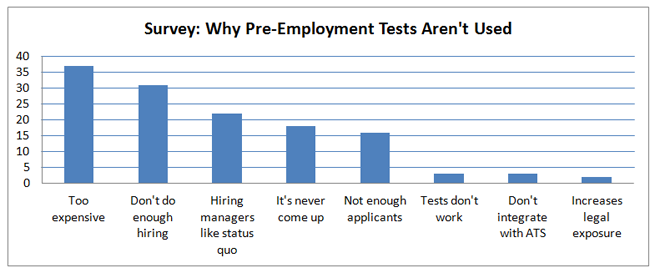Wonderlic recently surveyed over 300 HR professionals about their assessment strategy, and the results show a vast majority of respondents believe pre-employment assessments lead to better hiring decisions.
In fact, even 85% of those who work at companies that don’t use testing said “making better hire decisions” is an actual, realized benefit of using them. Which begs the question: If these people feel pre-employment testing leads to better hiring decisions, why don’t their companies use it?
91 of the respondents were from companies that don’t use pre-employment tests, and their responses help shed some light on the matter. They were presented with a list of possible reasons why their companies don’t use employment tests and asked to choose which they thought applied in their case (multiple answers could be chosen). The chart below illustrates the results, which are ranked from most chosen to least:
Consider the top 5 answers… if they really are the reasons, here is how I would counter:
- Too expensive: Quite simply, few HR investments can equal the potential for ROI that pre employment testing offers.
- Don’t do enough hiring: Making the best possible hiring decisions is important, especially at smaller companies, as each employee represents a larger percentage of the human capital.
- Hiring managers like status quo: When properly implemented, pre-employment tests streamline the recruiting and selection process, allowing hiring managers to evaluate more candidates per position. Broadening the field of candidates always enhances the potential for a better hire.
- It’s never come up: OK… maybe it’s time it does!
- Not enough applicants (to be able turn any away): This is a legitimate concern for some companies, but it’s also an indicator that the organization’s recruiting strategy is not optimal. Many testing companies can advise clients on how to increase their applicant flow, and can also provide the support and technology to help do it.
Only a few respondents chose any of the rest of the possible answers to the survey question (remember, more than one answer could have been chosen), so it seems as if most people understand the basic truths about pre-employment testing. Namely, testing does work, it integrates with virtually any ATS/HRIS technology, and, when conducted properly, doesn’t increase legal exposure. Just make sure to consult with your test publisher to make sure you have the proper protocols in place.









